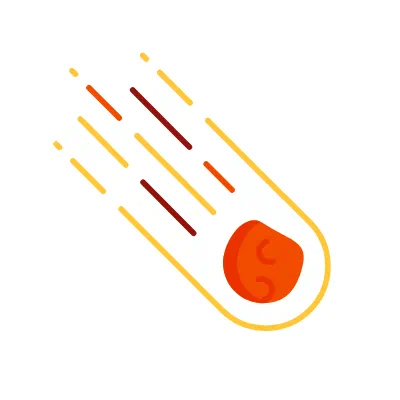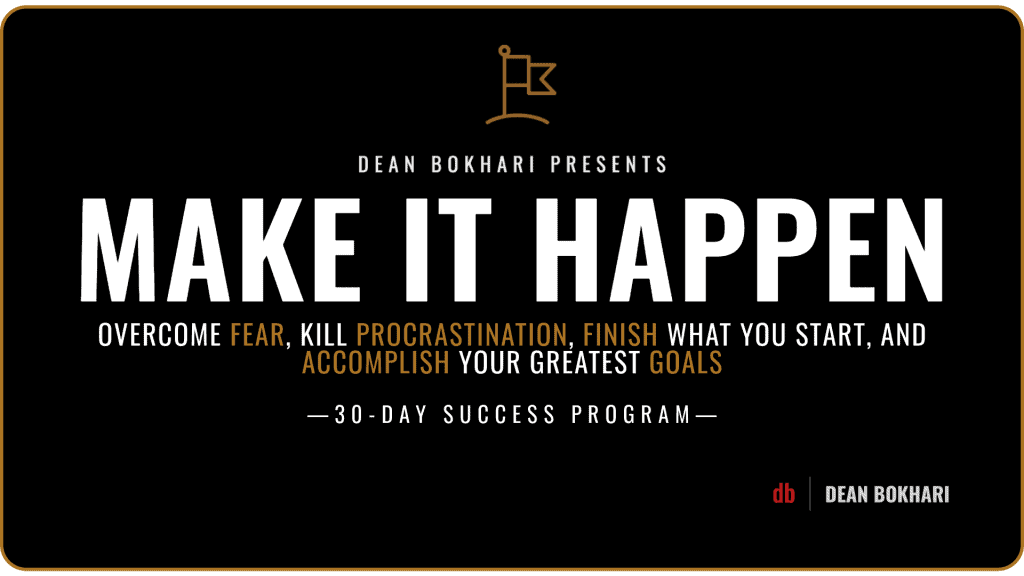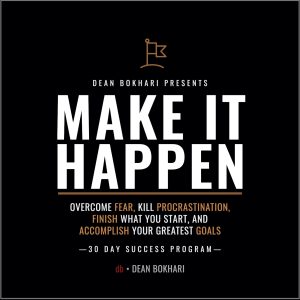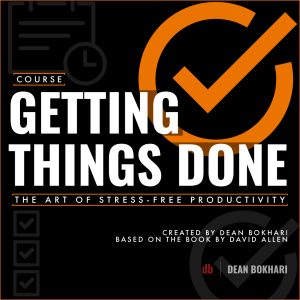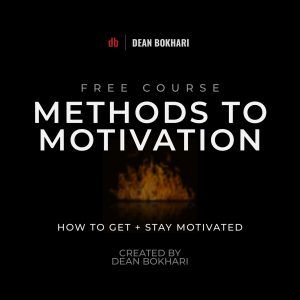This is a sample lesson from my flagship productivity program, Make it Happen.
As someone who speaks for a living, I often find myself in front of large crowds of people with nothing more than a microphone in my hand. The first time I ever spoke in front of a large audience though, the nervousness was nearly debilitating…
I felt the fear backstage as I was waiting to be introduced. I felt it as I was walking up to the podium. I felt it as I was reaching for the mic. I felt it as I looked out into the crowd. And I continued to feel that fear right up until the moment I uttered my first word and started speaking—at which point the fear finally began to disappear.
These days, I still feel those nerves, but I’ve developed certain strategies to deal with them, which I’ll share with you in today’s Make it Happen Method, which is all about—you guessed it—dealing with fear.
Let’s get into it.
FEAR… Everyone knows what it feels like. And if anyone tells you they haven’t—they’re lying.
As the author Amy Cuddy writes in her book, Presence:
“… stage fright can feel like a paralyzing overdose of anxiety. And what do people tell us to do when we’re anxious? They tell us … to calm down. As it turns out, that might just be the very worst thing they can say. You see, anxiety is what psychologists describe as a high-arousal emotion … when we’re anxious, we occupy a heightened state of psychological vigilance.
We’re hyper-alert. Our hearts race, we break out into a sweat, our cortisol may spike—all of these reactions are controlled automatically by our nervous system. And it’s virtually impossible for most people to shut off that kind of automatic arousal, to abruptly de-escalate it. Not only can we not calm it down, but when someone tells us to calm down, it also reminds us of how calm we are not, which stokes our anxiety even more.” — Amy Cuddy, Presence
But how do we deal with “high-arousal” emotions like fear, nervousness, and anxiety?
To figure that out, Amy Cuddy (the author I just quoted) points to the work of Harvard researcher Alison Wood Brooks, and goes on to tell us about another high-arousal emotion that’s actually not so negative at all; and is in fact, quite positive—excitement:
“Brooks predicted that we may not be able to extinguish arousal (fear, anxiety, nervousness), but we should be able to change the way we interpret it. So rather than fruitlessly trying to change the arousal level of our emotional states from high to low, what if we try to change them from negative to positive? From anxiety to excitement?”
In other words: Instead of trying to get rid of fear, try TRANSFORMING it into excitement.
How to use this Make it Happen method
Next time you feel fearful, nervous, or stressed — remember the following tips:
1.
Instead of trying to get rid of fear, try transforming it.
Fear and excitement are both highly energetic states. They’re also related to one another. Let yourself feel the fear, and instead of trying to ignore it (which doesn’t work), embrace it and transform it into excitement and enthusiasm. Some examples:
When you’re feeling afraid or anxious about something:
- Don’t tell yourself to “Calm down,”
- Instead, try transforming the energy behind that anxiety into excitement by literally saying to yourself, “I’m excited!”
When something stressful that you’d typically interpret as negative occurs:
- Don’t say, “OMG! Something’s wrong…”
- Instead, work on changing how you interpret and experience that situation from negative to positive, by saying something like, “Yes! I’m super-pumped and excited about this right now because my body’s giving me all of the energy and intensity I need in order to succeed in this moment!”
2.
Envision yourself approaching your fears with confidence + excitement.
Next time you know you’ll be in a scary/anxiety-inducing situation, mitigate the nerves ahead of time by imagining yourself approaching it with confidence and excitement instead of uncertainty and dread.
Imagine feeling energized and relaxed while you’re there, letting go of the fears that revolve around how others might be judging you.
And imagine leaving it with no regrets, knowing that you’ve done your best, regardless of the outcome.
